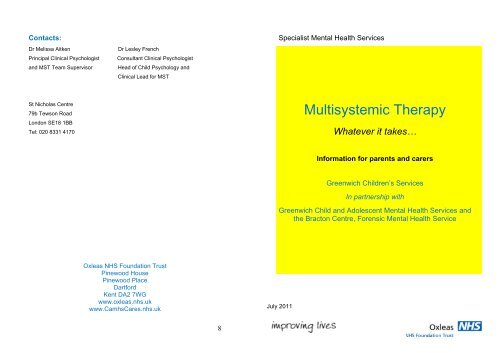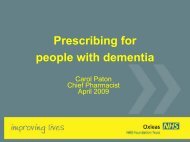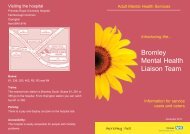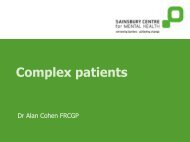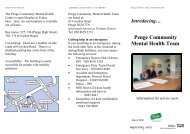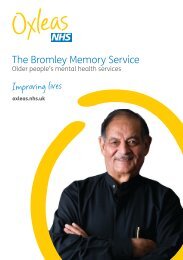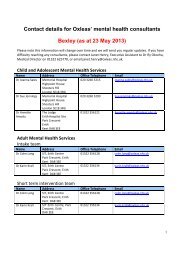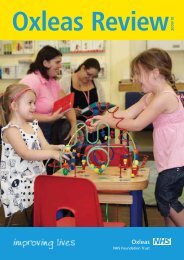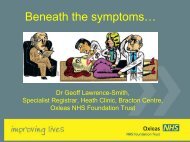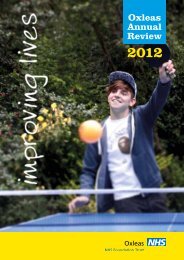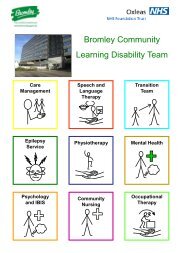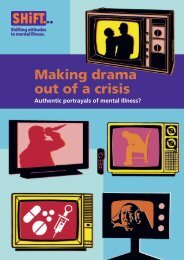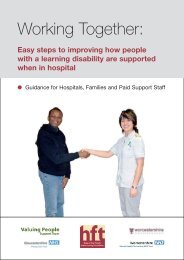Multisystemic Therapy - Oxleas NHS Foundation Trust
Multisystemic Therapy - Oxleas NHS Foundation Trust
Multisystemic Therapy - Oxleas NHS Foundation Trust
You also want an ePaper? Increase the reach of your titles
YUMPU automatically turns print PDFs into web optimized ePapers that Google loves.
Contacts:<br />
Dr Melissa Aitken Dr Lesley French<br />
Principal Clinical Psychologist Consultant Clinical Psychologist<br />
and MST Team Supervisor Head of Child Psychology and<br />
Clinical Lead for MST<br />
Specialist Mental Health Services<br />
St Nicholas Centre<br />
79b Tewson Road<br />
London SE18 1BB<br />
Tel: 020 8331 4170<br />
<strong>Multisystemic</strong> <strong>Therapy</strong><br />
Whatever it takes…<br />
Information for parents and carers<br />
Greenwich Children’s Services<br />
In partnership with<br />
Greenwich Child and Adolescent Mental Health Services and<br />
the Bracton Centre, Forensic Mental Health Service<br />
<strong>Oxleas</strong> <strong>NHS</strong> <strong>Foundation</strong> <strong>Trust</strong><br />
Pinewood House<br />
Pinewood Place<br />
Dartford<br />
Kent DA2 7WG<br />
www.oxleas.nhs.uk<br />
www.CamhsCares.nhs.uk<br />
July 2011<br />
8<br />
1
What is <strong>Multisystemic</strong> <strong>Therapy</strong>?<br />
<strong>Multisystemic</strong> <strong>Therapy</strong> (MST) is an intensive family based<br />
treatment aimed at reducing aggressive, antisocial and<br />
offending behaviour in young people. It is based on the<br />
understanding that young people are members of many<br />
systems (groups) which all influence the way they behave.<br />
FAMILY<br />
PEERS<br />
Your opinion matters<br />
We welcome your views on all of the services we provide. If<br />
you would like to comment, make suggestions or make a<br />
complaint, please speak to the person you normally see or<br />
ask to speak to the team manager.<br />
You can also speak to our Patient Advice and Liaison<br />
Service (PALS) by ringing the Free Phone number 0800 917<br />
7159.<br />
COMMUNITY<br />
SCHOOL<br />
MST helps parents and carers to understand how these<br />
systems are affecting their child’s behaviour. It helps and<br />
supports them to make the necessary changes across the<br />
whole network, to make it work for the young people, in a<br />
If you are unable to resolve your concerns or would like to<br />
take the matter further, please contact:<br />
Head of Complaints<br />
<strong>Oxleas</strong> <strong>NHS</strong> <strong>Foundation</strong> <strong>Trust</strong><br />
Pinewood House<br />
Pinewood Place<br />
Dartford DA2 7WG<br />
Tel: 01322 625751<br />
email: complaints@oxleas.nhs.uk<br />
2<br />
7
How do we get referred?<br />
You can be referred to the service by any professional<br />
working with your family. For example, a social worker,<br />
teacher or YOT worker. Once they contact us, we will come<br />
and meet you to discuss whether MST is the right service for<br />
you and answer any questions you may have.<br />
Confidentiality<br />
All of our staff is required to adhere to a strict code of<br />
conduct on confidentiality. There are times, however, when<br />
we may share some information with other professionals<br />
who do not work for <strong>Oxleas</strong> <strong>NHS</strong> <strong>Foundation</strong> <strong>Trust</strong>. These<br />
might be your GP and/or social services employees. When<br />
considering who may see information about the young<br />
person, our staff abides by the following principles:<br />
To only share information with those who need to know in<br />
order to provide good quality care<br />
Share the minimum information necessary to ensure<br />
good quality care.<br />
6<br />
way that increases positive behaviour and reduces negative<br />
behaviour. By approaching the systems from different angles<br />
at the same time, MST can be effective in changing<br />
behaviours that families may have been battling with for a<br />
long time.<br />
Who is it for?<br />
Young people of secondary school age (11-18 years) whose<br />
behaviour is seriously aggressive or antisocial, and where<br />
this may be placing them at risk of family breakdown, or<br />
custody. Young people must usually be resident in the<br />
London Borough of Greenwich and must live with a family<br />
member or long-term carer.<br />
What is involved?<br />
Firstly, a therapist will meet with parents, carers and the<br />
young person to hear about the behaviours that cause the<br />
most worry. Together with the therapist, the family will set<br />
some goals that the young person, themselves, would like to<br />
achieve. The therapist will then help the family come up with<br />
ideas on how they might manage to achieve these goals,<br />
and the therapist will help them develop skills and<br />
confidence to put these ideas into practice.<br />
3
Goals often include things like…<br />
Helping parents and carers feel they have more<br />
control over behaviour<br />
Improving the way that people communicate in the<br />
family<br />
Helping young people identify and ‘hang out’ with<br />
positive peers<br />
Encouraging young people to do positive activities<br />
Getting young people to go to school regularly<br />
Developing a support network around the family<br />
We understand that some behaviour is really challenging<br />
and real problems often arise that mean making changes is<br />
very hard. This puts a lot of pressure on parents and carers.<br />
Because of this, the therapist will visit the family home two or<br />
more times a week to support the young person, parents and<br />
carers, and will also telephone the parent or carer frequently.<br />
Visits will be arranged at times to suit their day-to-day routine.<br />
We also offer an out-of-hours telephone helpline, which<br />
means there is 24-hour access to advice and support.<br />
Therapists will also help parents and carers talk and<br />
communicate in other ways with systems such as school and<br />
social services. Therapists use different ways to help families<br />
achieve their goals. These include family or couples therapy<br />
(all talking together with the therapist), individual therapy (on<br />
your own with the therapist), behavioural management<br />
(where you can learn ways to cope with behaviour), as well<br />
as liaison with other services. The important thing to<br />
remember is that we are willing to try whatever it may take to<br />
help you make any changes needed to help your child. We<br />
will help arrange an assessment for the carer or relative’s<br />
needs to help them in their role.<br />
How long does it take?<br />
MST lasts for three to six months depending on how things<br />
are going. Once positive changes are made, the aim is to<br />
give families enough confidence to be able to keep things<br />
going on their own.<br />
4<br />
5


